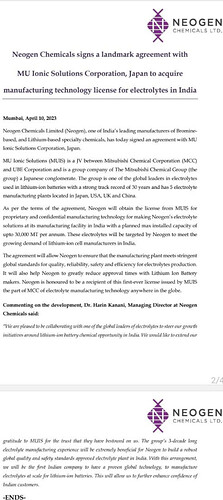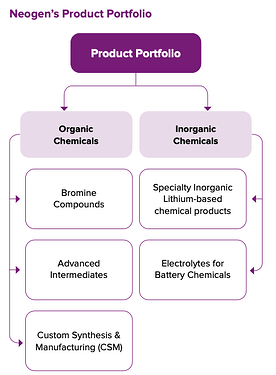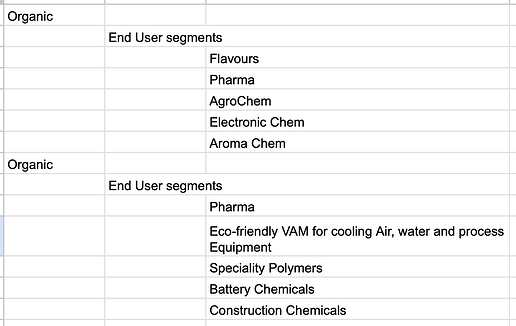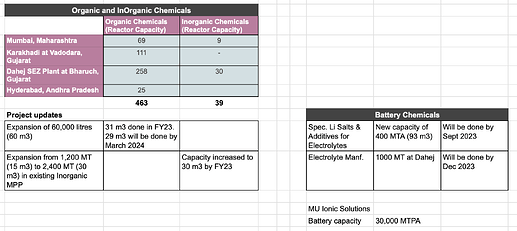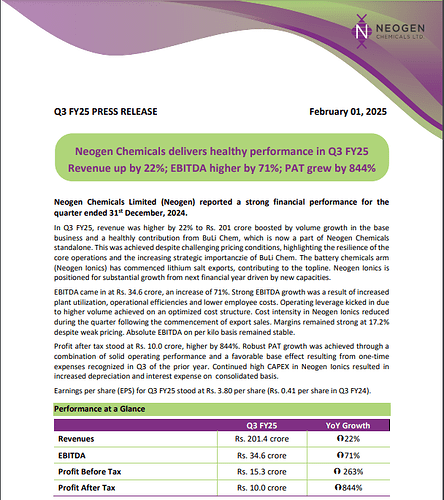The company has always guided for Ebitda around 18-19% in the past. I have not been following the company for a while , I wanted to know the Ebitda guidance for the newly announced electrolyte division ? And also the implications on the overall margins when these capacities are commercialized
Margins for new project:-
18.5%, +1 or -1%
Never got interested in this company primarily due to their revenue recognition policies, failure to convert profits into cashflows and some what unsatisfactory reserves and surpluses (full profits not reflected back into reserves)
Neogen Chemicals and Livent Corporation (NYSE: LTHM) today jointly entered into a definitive agreement for Neogen to acquire 100% stake in BuLi Chemicals India Pvt. Ltd (BuLi Chem) from Livent.
BuLi Chem owns the technology to manufacture N Butyl Lithium and other organolithium
products using lithium metal, which are key reagents for lithiation reaction used in manufacturing
of several complex pharmaceutical and agrochemical intermediates. BuLi Chem manufactures and
supplies N Butyl Lithium to several leading pharma and agrochemical companies in India and
across the world, and is built one of the very few commercial facilities outside of China for this
chemistry.
Neogen Chemicals (Neogen) is one of India’s leading manufacturers of bromine, lithium-based
specialty chemicals and advanced intermediates produced using multiple chemistries. This acquisition will boost Neogen’s portfolio by offering organolithium derivatives to existing pharma and agrochemical industries and further enhance its advanced intermediates & CSM manufacturing business. More importantly, Neogen will significantly gain from BuLi Chem’s established & proven technology expertise for handling lithium metal & organolithium derivatives. Overall, it will unlock deep synergies by complementing the current portfolio.
Commenting on the development, Dr. Harin Kanani, Managing Director at Neogen Chemicals
said: “We are glad to be acquiring BuLi Chem, which houses the Indian operations of Livent USA Corp - one of the global leaders in speciality lithium technology. We are happy to welcome the employees of BuLi Chem who have deep experience of more than a decade in handling Organo Lithium Chemistry to the Neogen family. They have managed to develop one of the few facilities outside of China for this chemistry with strong track record in safety and sustainability. Organo Lithium compounds are important in manufacturing several critical Pharmaceuticals and Agrochemicals intermediates, and we are happy to continue our association and serve this essential need of the society. The technology to use highly reactive Lithium metal and to manufacture N Butyl Lithium and other Organo Lithium derivatives in-house along with Neogen’s ability to recycle Lithium, will give significant competitive advantage to our existing as well as under-development Pharma Advanced intermediates and CSM projects, further enhancing our ability to provide value-added innovative solutions to our global customers.”
Commenting on the development, Walter Czarnecki, Chief Commercial Officer at Livent said:
“We believe this will be a great outcome for all parties. Neogen is focused on the pharmaceuticals and
chemicals market in India and shares Livent’s commitment to employees and local communities. We look forward to seeing this facility and our former colleagues thrive under the new ownership and will do everything we can to support a smooth transition.”
Neogen Call on acquisition of manufacturing technology licence for electrolytes from MUIS
-
Collaborated with the global leader of electrolyte MUIS. They have 30 years of experience in Electrolyte and worked with the majority of the cell producers in the world and they are the market leader. For Neogen it will reduce approval times with Indian Lithium Ion Battery makers.
-
Neogen will obtain the licence from MUIS for proprietary and confidential manufacturing technology for making Neogen’s electrolyte solutions at its manufacturing facility in India with a planned max installed capacity of upto 30,000 MT per annum.
-
Neogen is the first company to receive the first-ever licence issued by MUIS of electrolyte manufacturing technology anywhere in the globe.
-
The licence fees will be paid as a one time fee for 30,000 MTPA and after this 30k capacity for every additional capacity of 10,000 MTPA they will need to pay licence fee for every additional 10k capacity. The licence fee will be capitalised, the payment will be made on the basis of completion of plant capex in next 1 to 2 years in a staggered manner as per the agreement.
-
As per the agreement MSUI will provide and help in manufacturing of the plant with designing, maintain stringent quality, will provide detailed SOP, training from MSUI on how to run the plant, will help in efficiency and speedup the manufacturing. They will also be involved in the startup of the plant like for the first few products on how to produce and manu.
-
The previously announced capex for electrolyte was 10,000 MTPA. As of now they have not decided on how much capacity to put in, should they go with 10k initially and then ramp it up to 30k MTPA or put it directly at a capex of 30k MTPA. This will be decided in the next few months after discussion with the customers and getting an idea on the demand scenario after signing this agreement.
-
The licence fee which they need to pay is on the basis 30k MTPA capacity, so even if they go with lower capacity they have to pay full fee as per agreement.
-
It will help the company to have a fully backward integrated plant for electrolyte and with better quality.
-
This technology will be only for electrolyte in the domestic market, they can’t set up plants outside India without their permission as per the agreement. Even they can’t sell the products outside India without permission from MSUI.
-
Currently this agreement is only for plant commissioning, in future they can also obtain the secondary licence for any specific product or recipe from MSUI or Mitsubishi as per the requirement of the customer. MSUI has hundreds of recipes for different products which they produced in 30 years, each particular cell design has a different recipe.
-
There is no any limitation on purchase of raw material or selling of products in the domestic market. Neogen will also work with the MSUI on marketing and to obtain orders from the customers.
-
Transport of electrolyte is very difficult as they need specialised tanks for transport, so say if one wants to import 30k from Japan then the amount of these special tanks will cost the same as the cost of the plant.
-
Electrolyte will have a shorter working capital cycle as compared to the current business of Neogen.
My Notes from 2023 Annual Report for Neogen Chemicals:
-
One of India’s leading manufacturers of bromine-based and lithium-based speciality chemicals.
-
4 state-of-the-art manufacturing facilities with reactor capacity of 463 cubic meters - [Organic chem] and 39 cubic meters- [ InOrganic chem] for manufacturing Organic & inorganic chemicals capacity respectively.
-
Growth plans for our existing Organic and Inorganic Chemicals as well as the Battery Chemicals business – both of which will be commissioned during the financial year FY 23-24
-
There are multiple levers fuelling the long-term marathon to success. This encompasses the
-
- strengthening of our product portfolio and
-
- our expansion initiatives, and
-
- expanding our R&D prowess across high-potential chemistries to offer deep value to our customers.
-
We have shaped up compact growth plans for our organic and inorganic chemicals business, and also for the upcoming and fast growing battery chemicals business.
-
Expanded our product portfolio from 20 products in 2001 to over 244 products by end of March 2023, with application across multiple industries.
-
Our Value-Added Product Chain
With an experience of more than 3 decades, our manufacturing capabilities and with value-added products (advance intermediates and organolithium derivatives ), we are moving up the value chain. -
We not only manufacture speciality chemicals, but also undertake custom synthesis and contract manufacturing to develop custom products through in-house process know-how and technical specifications.
-
Organic chemicals
Organic compounds containing Bromine, Chlorine, Fluorine, Iodine-based combinations thereof and specialty chemicals, such as, organometallic grignard reagents and organolithium derivatives (with recent acquisition of BuLi Chem) as well. -
- Revenue from Organic segment was 68% and InOrganic was 32% for FY23.
-
- Export : Domestic = 50-50
-
Customer segments
BULI CHEM
- We acquired 100% stake in BuLi Chem. These landmark steps are set to significantly bolster our competitive position in the market.
-
- This acquisition will allow Neogen to offer organolithium compounds which are offered by very few companies in the world, which are used for Lithiation chemistry in mostly pharmaceutical, agrochemical and electronic industries.
-
- BuLi Chemicals owns the technology to manufacture N Butyl Lithium and other organolithium products using lithium metal, which are key reagents for lithiation reaction used in manufacturing of several complex pharmaceutical and agrochemical intermediates.
-
- The backward integration into N Butyl Lithium also enhances Neogen’s ability to win Custom Synthesis and Manufacturing project using Lithiation chemistry.
-
- BuLi Chem houses the Indian operations of Livent USA Corp, a global leader in speciality lithium technology. It has managed to develop one of the few facilities outside of China for this chemistry, with a strong track record in safety and sustainability.
- Neogen’s experience to recycle lithium for last >20 years, the recycle of waste produced during production of N Butyl Lithium will also make Neogen’s Inorganic lithium salts business more attractive.
MU Iconic Solutions
- With 3 decades of experience in lithium chemistry to manufacture lithium-ion battery materials, we entered into an agreement with the world’s oldest electrolyte producer, MU Iconic Solutions in Japan, acquiring the manufacturing technology licence for lithium electrolytes - with 30,000 tonnes per annum capacity.
- MU Ionic Solutions (MUIS) is a JV between
-
- Mitsubishi Chemical Corporation (MCC) and
-
- UBE Corporation and is a group company of The Mitsubishi Chemical Group, a Japanese conglomerate. The group is one of the global leaders in electrolytes used in lithium-ion batteries with a strong track record of 30 years and has 5 electrolyte manufacturing plants located in Japan, USA, UK and China.
-
- As per the agreement, Neogen has obtained the licence from MUIS for proprietary and confidential manufacturing technology for making electrolyte solutions at its manufacturing facility in India with a planned maximum installed capacity of up to 30,000 MT per annum.
-
- It will also help Neogen to greatly reduce approval times with Lithium-Ion Battery makers.
-
- Opportunity set:
-
- A) We are the largest users of lithium carbonate in India and a manufacturer of speciality lithium-based derivatives. With our early entry into making of electrolytes and electrolyte salts, we hope to manage the initial demand for electrolytes and electrolyte salts in India.
-
- B) In the international market where the demand for electrolyte salts is projected to be 20 times higher than that in India by 2030. Neogen is eyeing a revenue of Rs. 1,000-1,200 crore from the battery chemicals segment by 2027 which would be even prior to the licence agreement.
BATTERY CHEMICALS DIVISION
Neogen Ionics - Our Battery Chemicals business will commence in a separate entity – Neogen Ionics, a wholly-owned subsidiary of Neogen Chemicals on March 29, 2023.
- The battery chemicals business will have high volumes compared to Neogen’s legacy business.
- This company will also have the advantage of lower corporate tax rate of 15%.
- Neogen had planned to add 10,000 MT electrolyte capacity and 2,000 MT specialty lithium salts capacity, to be commissioned over FY 24-25 and FY 25-26. Post agreement w/MU Ionic - now reviewing its capex, since it now has a licence to manufacture electrolytes which has further increased customer confidence. This licence comprises the transfer of technology for a manufacturing ‘facility’ and ‘process’ with a maximum capacity of 30,000 MT intended to meet the demand for electrolytes in India.
- To support such expansion plans, Neogen approved a Rs. 450 crore capital expenditure for setting up in phases 10,000 MT electrolyte and 2,000 MT Lithium electrolyte salts manufacturing capacity, by September 2025, however, the same is currently being reviewed pending completion of design by MUIS team and long-term MoUs/ agreement with customers for the same.
Opportunity Set
- In the past, the growing demand for consumer electronics among the country’s population has been the main factor driving the market for lithium-ion batteries in India. However, with the growing global need to achieve Carbon Neutrality, the demand for lithium-Ion Batteries is being driven by increasing usage of Electronic Vehicles (EV) as well as Battery Storage systems for Renewable energy. India is expected to have a demand of 160 GWh of Lithium Ion batteries by 2030.
- There are more than 10 companies in India - establishing Giga Factories having targeted annual cell production of 5 GWh – 40 GWh by 2030. Together they are expected to have an annual cell production of >150 GWh by 2030 of which 50 GWh is currently supported by Government’s Rs. 18,000 Crore Advance Cell Chemistry (ACC) PLI Scheme, which requires start of production by 2024 and reaching peak potential by 2028.
- The PLI scheme also requires the companies to reach min 60% India value addition, which creates a significant demand for Lithium-Ion ACC supply chain.
- By 2030 expectation for India is to reach production >150 GWh cells & the world demand to be >3,000 GWh approximately 20 times India’s demand, thus also creating an export market for Indian Lithium-Ion Battery Cell materials manufacturer.
- The government’s battery swapping policy would gain popularity in commercial applications like 2W and 3W autos due to the fact that replacing the depleted battery is more feasible than on-the-spot charging for EVs. This would allow for faster penetration of lithium batteries in these market segments.
Capacities
General Commentary / Notes
-
We have implemented current good manufacturing practices prescribed by the USFDA as applicable for intermediates. Our world-class operational facilities include Zero Liquid Discharge, significantly reducing water usage.
-
The Company achieved its highest-ever revenues, driven by higher contributions from expanded capacity, a consistent demand situation and a positive shift in the business mix towards value-added products. Revenues grew 41% at Rs. 686 crore owing to incremental contribution from expanded capacities, positive demand trajectory and a favourable product mix.
-
We were able to pass on the significant increase in prices of lithium raw materials to the customer, protecting the absolute EBITDA.
-
Business Segments:
-
- 28% increase in Revenue of Organic Chemicals which was largely volume-driven,
-
- while Revenue of Inorganic Chemicals grew 80%. A large part of which was on account of significant increase in prices of lithium raw materials and the balance was from contributions by new customers that we added during the year.
-
In FY 22-23, we added 82 new customers, which contributed 7% to our revenue within India and globally, taking our total customer tally to almost 1,550 customers.
-
In the CSM/ advanced intermediate business, the Company started witnessing traction from other newer sectors which are non-agro and non-pharma and we endeavour to progressively increase the contribution at the Company level.
-
The Company intends to make significant capital investments in the field of electrolytes and lithium compounds over the next 3 years, while also focussing on innovation in these products.
-
On sourcing of Lithium risk - The Company’s more than 3 decades of relationship with two of the world’s largest Lithium mining companies ensure stable supply. To further de-risk, Neogen has added 2-3 additional global suppliers’ of Lithium to ensure continuity of supply. In order to safeguard its profit margins, the Company makes it best effort to pass on the fluctuating costs of lithium to its customers and getting into Lithium market price linked FG price arrangement with customer for a long period of time.
Since most of the upside going forward is projected to come from the battery chemicals division (mostly electrolytes), it is important to understand dynamics of that industry :
- “The manufacturing of electrolyte is considered “easy” with a short construction period of 6- 12 months, according to the company. According to Mr. Han Heng, Board Secretary of Tinci, making electrolyte is as simple as making Coca-Cola, which simply involves mixing flavourings and sugar with carbonated water.” This indicates that the barriers to entry globally are low.
- Electrolyte manufacturing in China is fragmented, with Tinci and Capcem accounting for 36% and 12% of domestic market share in 2022, respectively, with a long tail of manufacturers beyond that.
- The entry barriers to manufacturing electrolyte are therefore not in the production itself, but in the sourcing of raw materials – Source: Daiwa Capital Markets.
NCL imports >50% of Lithium Carbonate and Lithium Hydroxide in India, so it could be at an advantaged position here.
Competition:
Indian companies that have announced plans for Electrolyte Manufacturing:
- Ami Organics (MCap: INR 4,200Cr): Has signed a non-binding MoU with a global manufacturer of electrolytes and will build a dedicated manufacturing facility at a cost of ₹300 crore.
- Gujarat Fluorochemicals (MCap: INR 35,000Cr) will manufacture batteries for electric vehicles using its fluorine chemistry skills for making battery chemicals.
Planned capex for GFCL: FY24: ~ Rs 800 cr , FY25: ~ Rs 900 cr , FY26: ~ Rs 1500 cr
Asset turnover expectation of 2x and EBITDA margin expectation of over 25% at full capacity utilization of these capex.
(3Q24) Starting with the three products right now where we have gone commercial LiPF6, LIF and high-grade HF. Electrolyte plant is also ready.
These 2 are the only companies that have announced and set up capacity for electrolyte manufacturing in India. The commitment by Ami Organics is much smaller at INR 300Cr.
Indian companies that have announced plans for other battery parts Manufacturing:
- Aether Industries (MCap : INR 11,000Cr) - : Has announced (3Q24) a strategic agreement with a global lithium-ion battery producer to expand into the electrolyte additives market. No CapEx for this has been announced yet.
- Himadri Speciality Chemicals (MCap : INR 16,000Cr) : is also planning to establish a manufacturing facility for lithium-ion battery components with a total capacity of 2 lakh tonnes per annum. Over a roughly six-year period, an estimated Rs 4,800 crore will fund this project. They have not made any announcement about manufacturing electrolyte. They plan to manufacture Cathode material (LFP) Lithium Iron Phosphate. Facility to be live by 2025-26.
- Tata Chemicals (MCap: 29,000) : While the company has not explicitly spoken about making EV chemicals, they have been on the radar since the Tata Group signed up for the $1.6 billion EV battery plant. Every tonne of Lithium Carbonate requires two tonnes of Soda Ash, which may translate into a significant opportunity for them.
While it needs to be seen how NCL will respond if competition were to increase going forward, as electrolyte manufacturing doesn’t seem to have high barriers to entry, and management’s current projections are based on NCL getting 25-40% market share in electrolyte manufacturing in India.
Discl : Invested
NCL imports >50% of Lithium Carbonate and Lithium Hydroxide in India.
You refer to NCL Industries or NLC India …
Understand!!! Thankyou
Neogen Chemicals | Q3 FY25 Update
Neogen Chemicals reported a 22% YoY revenue growth, reaching ₹201 crore in Q3 FY25, fueled by expansion in its core business and contributions from BuLi Chem. Despite pricing headwinds, operational performance remained strong.
Neogen Ionics (NIL) began exporting lithium salts, adding to revenue. With new capacities coming online next year, NIL is set for significant growth.
EBITDA surged 71% to ₹34.6 crore, driven by improved plant utilization, operational efficiencies, and lower costs. Export sales helped reduce Neogen Ionics’ cost intensity.
Margins held firm at 17.2%, despite pricing pressure.
PAT skyrocketed 844% to ₹10 crore, benefiting from robust operations and a low base due to prior one-off costs. However, higher CAPEX in Neogen Ionics led to increased depreciation and interest expenses.
Lower bromine prices impacted revenue, which would have been ₹34 crore higher had prices remained stable. Similarly, the decline in lithium prices affected inorganic revenue, which would have been ₹13 crore higher in Q3 FY25 under stable pricing conditions.
FY26 revenue guidance revised to Rs. 775–850 crore (from
Rs. 950–1,000 crore)
Capacity of BuLi Chem facility in Hyderabad more than doubled from 120 MT active to 300 MT active through debottlenecking initiative
Neogen Q4.pdf (3.2 MB)
Can anyone enlighten on the management plan to reduce the debt they are going to incur over the next 2 years.
It seems the debt to ebidta will skyrocket
One more small company doing electrolyte for energy storage devices is Tatva Chintan. Extract from their Q4 FY25 concall -
"ES:
The customer using our electrolyte for energy storage devices has been gaining momentum and the volumes have started to pick up from first quarter of FY26. Besides the electrolyte salts for energy storage devices, our pilot scale sample for the third product required to make the electrolyte solutions has been formally approved by the customer. We are now undergoing minor modifications to our existing setup to incorporate commercial supply for the high purity material required for making electrolyte solutions. We will be sending commercial scale material for final validation of the product in Q2 of FY 26. This marks a meaningful step forward in deepening our engagement with this key account and also enabling us to do a step forward from electrolyte salt to electrolyte solutions.Additionally, our qualification process with another strategic customer—who is involved in manufacturing batteries for hybrid vehicles—is progressing well. We have not received any adverse feedback from them, which reinforces our confidence in the robustness of our offering and our alignment with their technical expectations.
Given these developments, we anticipate that this segment will continue to grow gradually and steadily. More importantly, we see it evolving into a long- term value contributor for the company, aligned with global trends towards electrification and sustainable mobility. "
Hi what is your take on chinese suppliers on this as they are cheap and already in scale? My doubt is GFCL also in same time line to supply EV battery chemical.
What will happen when china starts dumping there EV chemical ?
Neogen Chemicals – Q2 & H1 FY26 Concall Summary
- Overall Performance (Q2 FY26)**
- Revenue: ₹209 cr, +8% YoY
- Organic revenue: ₹184 cr (+12%)
- Inorganic revenue: ₹24 cr
- Neogen Ionics revenue: ₹5.42 cr
- Gross profit: +16% YoY; 350 bps expansion
- EBITDA: ₹30 cr (margin suppressed by: higher employee cost, increased insurance premium, outsourcing/job-work costs due to Dahej outage)
- PAT: ₹3 cr (hit by higher finance costs, low Dahej utilisation, initial Ionics cost)
2. Key Operational Update
Dahej fire impact managed via alternate plants
- Production diverted to other plants + outsource partners.
- Higher temporary costs → to be recovered via insurance in FY27.
- Dahej SEZ organic plant to resume in FY27; interim losses to be claimed then.
**3. Strategic Updates **
A) Battery Chemicals – Electrolyte & Salt
- Electrolyte plant:
- Mechanical completion in Q4 FY26.
- Trial production: Q1 FY27.
- Commercial production: H1 FY27.
- Electrolyte Salt (LiPF6) plant:
- Commercial production: H2 FY27 (after tech homologation with JV partner).
B) Approvals / Milestones
- Cleared PPAP approval for electrolyte from a major Indian giga-factory (likely Ola).
- Received provisional approval for electrolyte salt; final expected Jan–Feb 2026.
C) Joint Venture (Major Event)
- Indo-Japan JV formed: Neogen Morita New Materials (NML).
- Purpose: Solid LiPF6 salt & related materials.
- Ownership: Neogen Ionics ≥80%, Morita ≤20%.
- Only non-FEOC compliant LiPF6 plant in India (critical for US 45X tax credit rules).
4. Battery Chemicals Guidance (Revised)
FY26
- Earlier: ₹300 cr
- Now: ₹30–40 cr (big cut due to delay in electrolyte demand + approval gap).
FY27
- Expected: ₹400–500 cr
- ~50% electrolyte
- ~50% salt
FY28
- Expected: >₹1,000 cr, potentially >₹1,500 cr depending on ramp-up.
Full Utilisation
- FY29: ₹2,400–2,900 cr (combined electrolyte + salt capacity)
5. Base Business (Standalone) Guidance
- FY26: On track for ₹850 cr revenue
- FY27: ₹950–1,000 cr (full utilisation)
- FY28: Double-digit growth without new capex (~₹1,150 cr potential)
CSM + Organolithium seeing strong demand (CSM reached 16% despite fire impact).
6. Approvals Demand Outlook (Salt + Electrolyte)
- US EV makers must switch to non-FEOC supply by 2027 → accelerates demand.
- Global salt demand (US): 40–60 KTA by 2027.
- Neogen to be #3 or #4 global supplier (post Japan & Korea).
7. Financial Position / Balance Sheet
- Standalone debt: ₹722 cr
- Standalone net debt: ₹595 cr
- Consolidated debt: ₹1,078 cr
- Consolidated net debt: ₹900 cr
- Liquid investments: ₹167 cr
- DSCR: 2.1×, considered healthy.
NCD Issue
- ₹200 cr raised to fund Dahej rebuild + liquidity buffer.
Insurance Payouts
- Received: ₹80 cr (capex related).
- Expected next tranches: ₹300 cr over next year (inventory + loss-of-profit).
8. Capex Update
- Total capex completed: ₹620 cr
- Capex by FY26-end: Additional ₹500 cr
- Total project capex (Dahej + Pakhajan): ₹1,500 cr
- Peak gross block by FY27-end: ₹2,000 cr (consolidated)
- Peak debt expected ~FY28/FY29: ₹1,800 cr
9. Margins Outlook
- Standalone margins return in FY27:
- 18% EBITDA ±1–1.5% at full utilisation
- Neogen Ionics:
- ROCE target: 20%
- EBITDA margin: 16–20% (dependent on lithium price volatility)
10. Key Risks / Constraints Discussed
- Delay in Indian giga-factory starts (Ola/Exide/Amara Raja) → pushes demand by 6–12 months.
- Approval delays for salt (final approval moved to Q4 FY26 / Q1 FY27).
- Higher insurance premiums post-fire.
- Working capital build-up due to inventory destroyed in the fire.
- Lithium price volatility can temporarily impact margins.
** taken from the concall.
Hi everyone,
I recently spent some time analyzing the sharp correction in Neogen Chemicals (down >50% from highs). It’s an interesting case study on how “Leverage” cuts both ways.
While the consensus view is negative due to delay in battery chemical business and high debt levels, I think the market might be overlooking the optionality from the recent Morita JV. The current market cap seems to be valuing the company largely on its base business, assigning very little value to the upcoming battery chemical capacity.
I’ve compiled my notes into a detailed article on Substack -
Please give it a read and would love to hear your thoughts.
The simple problem with Neogen was that it made limited cash flows from operations. Companies that dont make decent CFO invariably fall into a debt trap when they try to grow.

